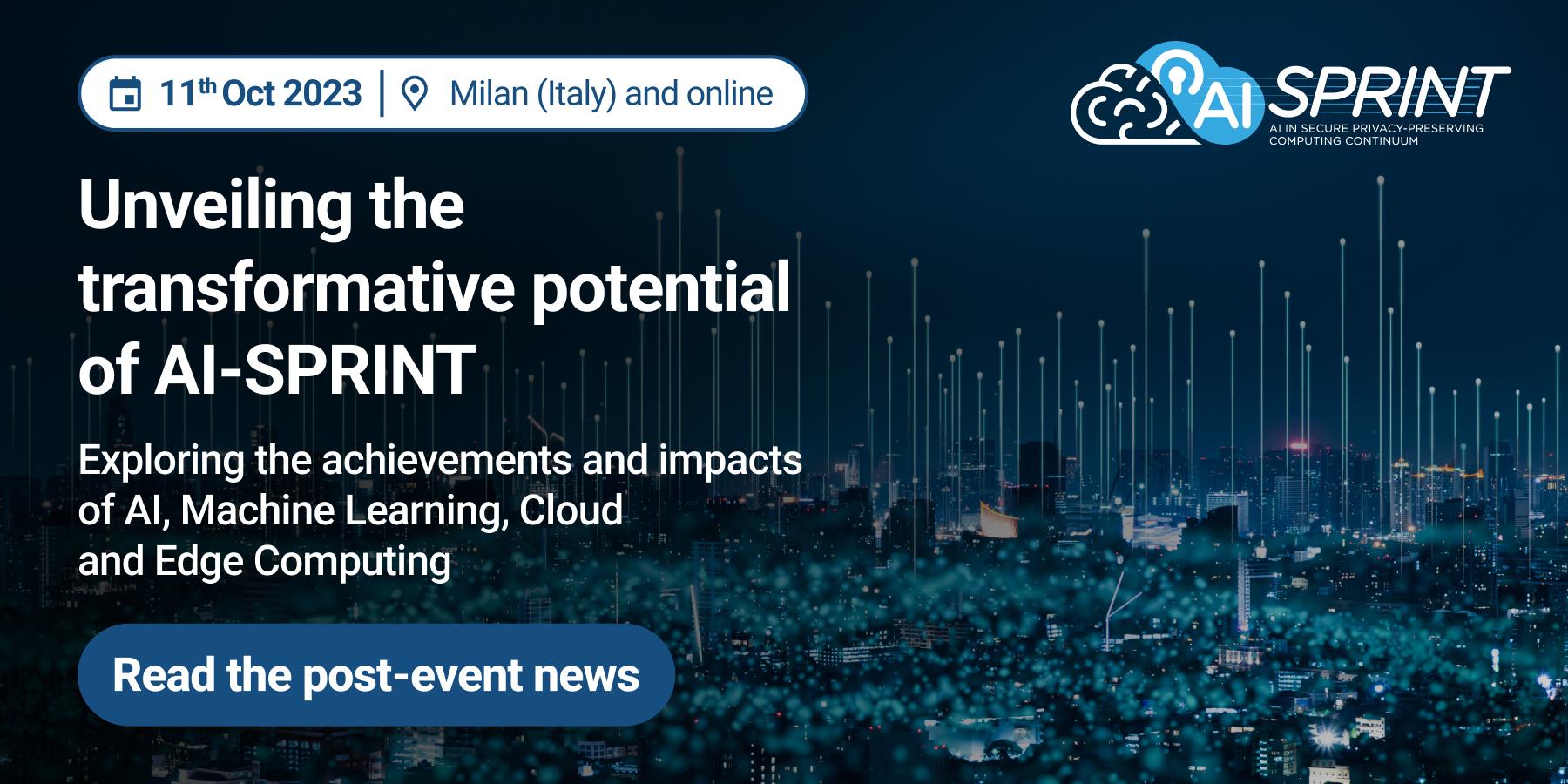
- 27 November 2023
The AI-SPRINT Final Event was held in Milan, Italy on 11 October 2023. The event opened with a welcome by coordinator Danilo Ardagna of the Politecnico di Milano and an introductory talk by the AI-SPRINT Project Officer Stefano Foglietta, who highlighted the growing importance of AI within the Cloud-Edge Continuum, together with the consequent emphasis on this subject within the Commission’s digital strategy.
He was followed by IDC market research expert Giorgio Micheletti, who gave a perspective on market insights and future trends. He set the scene for the rest of the day, outlining how the cloud sector dominates the industry today, but has laid the groundwork for the push toward the edge: one in three companies is currently involved in edge computing, but that number is expected to double in the next two years. More to the point of the day’s work, the cloud-edge combination is becoming a platform for AI use cases, with a whole new host of business models opening up, as well as an emerging need for skills and capacity building.
Next up were practical demonstrations of the real-world impact of AI-SPRINT. The agricultural use case demonstrated how AI can enable an enterprise not only to enhance its business-related activities, but also to ameliorate its environmental impact. Pesticides are a necessary factor in viniculture, but awareness has grown over the years of the damage they can inflict on the environment. Prior to AI-SPRINT, the best that could be done was to calculate dosages based on the size of an area. But AI-SPRINT made it possible to refine dosages down to the level of the foliage and its characteristics.
The agenda proceeded with testimonials by external collaborators with AI-SPRINT. Luxottica, the world-famous maker of luxury eyeglasses, described its collaboration with AI-SPRINT coordinator Politecnico di Milano to provide an augmented reality experience in its eyeglasses by leveraging the full power of the Cloud (major data processing) to Edge (user’s wristwatch) to IoT (Luxottica eyeglasses) Continuum.
The testimonials were followed by a session on one of the most important aspects of the AI-SPRINT vision: the release of its tools in open source, in order to maximise their potential take-up and impact by the community. The session was populated by talks from the perspective of the Commission (Luis Carlos Busquets-Perez), and from the European software development community perspective (Gael Blondelle, Eclipse Foundation), whereby in particular the rich and varied palette of open-source licensing possibilities for the results of projects like AI-SPRINT was explained in great detail.
In the final session of the day Trust-IT Senior Research Analyst John Favaro moderated a Panel Session on the current and future trends in AI-enabled innovation across the computing continuum. Fabrizio Magugliani of the E4 Company went back to the original topic of the day, the dominance of the Cloud, pointing to the rise of the hyperscalers (such as Amazon and Google) as a key factor in this phenomenon, while emphasizing the need for a European response. Giorgio Micheletti of IDC (the day’s first speaker), pointed out that the growth of the Cloud industry also inevitably was leading also to exponential growth in the European data market. Patrick Thiem of Cloud&Heat, the cloud provider within the AI-SPRINT consortium, noted that Europe has a capacity for innovation in this area that should be exploited, and gave an example of personalised, cloud-supported wearables that can accompany users throughout their day, gathering valuable information. At the same time, he noted that AI-SPRINT has correctly identified the issues of privacy and security that such innovations bring with them, and has dedicated resources to addressing these issues. Professor Juan Carlos Nieves Sanchez of Umeå University, a member of the AI-SPRINT Expert Advisory Board and a founding member of the AI Doctoral Academy and the TAILOR network of European AI actors, returned to the urgent need for skills-building in AI today, as well as a need to address the rapidly emerging issue of ethics in AI. Professor Giovanni Agosta of the Politecnico di Milano seconded this emphasis on the need to provide a strong curriculum in the universities, and expanded on his experience with open source in the ISOLDE project. His colleague Matteo Matteucci of the Politecnico di Milano continued the discussion of how open source and the component-based approach of the AI-SPRINT toolset supported its targeting of an industrial user community whose main business was not software or AI, but which needed the possibility to enhance its main value proposition with AI-enabled functionality.
The discussion then turned to the business-related implications of the AI-SPRINT results. Panelist Anna Escoda of the Barcelona Supercomputing Center (partner in AI-SPRINT) is responsible for Technology Transfer within that institution, where pioneering technological innovation occurs at a continuous pace. She explained that, while creating a successful spin-off is always a challenge, there are particular challenges when dealing with public entities and administrations that are involved in the mix, which must be given special consideration. Panelist Paweł Bochniarz of Valuetech is a member of the AI-SPRINT Expert Advisory Board, and a venture capital executive who invests in early-stage deep tech startups. Pawel offered insights on the transformation of AI innovation into companies with an impact. He noted that the current popularity of AI is such that nearly every start-up proposal that passes over his desk claims to offer AI – but upon closer inspection too often offers only a thin veneer of AI that does not materially affect its value proposition. Thus, the challenge is to create innovations – like those of AI-SPRINT – with the potential for true, value-creating impact in the real world.
Upon the close of the panel session, AI-SPRINT coordinator Danilo Ardagna once again took up the reins at the podium to thank the participants and to encourage them to take up and disseminate the results of AI-SPRINT in their own work, helping to fulfill its vision within the broader community.